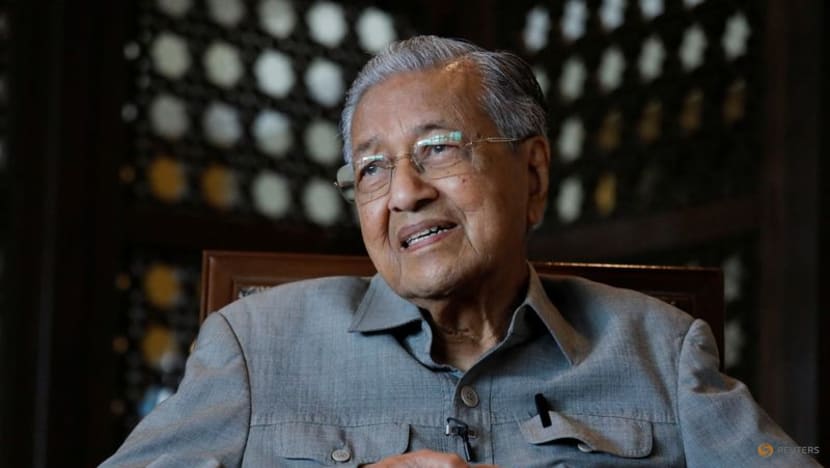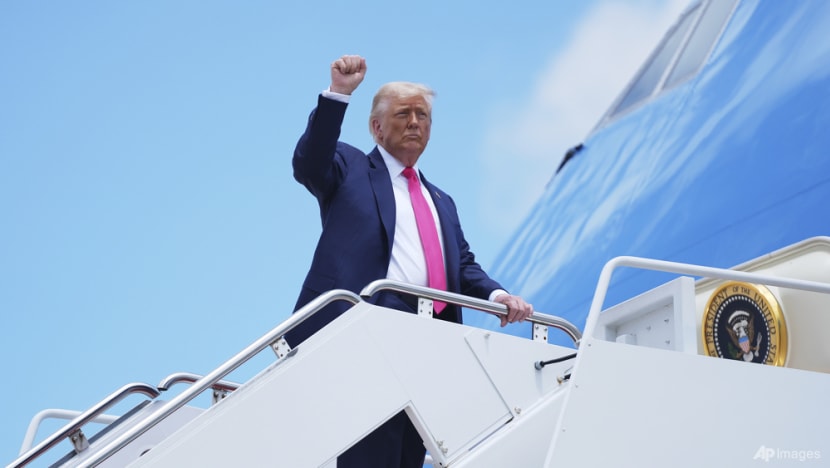Commentary: At 100, Dr Mahathir has a unique opportunity to shape his legacy in the era of Trump
There is a profound, almost paradoxical, power in former Malaysian Prime Minister Dr Mahathir Mohamad issuing warnings about the trajectory of Western democracy, says Southeast Asian politics expert Sophie Lemiere.


This audio is generated by an AI tool.
PARIS: This month, as Dr Mahathir Mohamad marks his 100th year, the world contemplates not just longevity, but the enduring enigma of political power he embodies.
The former Malaysian prime minister’s milestone comes at a time when the archetype of the "strongman" leader is resurgent globally – from Hungary to, undeniably, the United States where President Donald Trump is barely six months into a second tumultuous term.
This context offers Dr Mahathir, the ultimate political strategist and survivor, a unique lens through which to refract his own legacy – not merely to reflect on his doings, but to actively reshape its perception.
DR MAHATHIR’S COMPLEX LEGACY
On their own, Dr Mahathir’s two stints as prime minister make for a complex legacy.
His first, defining 22-year premiership – from 1981 to 2003, when he was president of the ruling United Malays National Organisation (UMNO) – stands as a cornerstone of modern Malaysia.
It was an era of profound transformation: Towering skyscrapers, sprawling highways, and ambitious industrialisation projects testified to his relentless drive for development. Per capita gross domestic product more than doubled.
Yet, this progress was inextricably intertwined with a consolidation of authority, a governance style often justified by the imperative of stability for advancement, articulated through the framework of distinctive "Asian values".
His tenure showcased a masterful ability to navigate, and often orchestrate, political sentiment, positioning himself as a leader whose firm hand was the necessary price of Malaysia’s progress.
Then in 2018, an audacious political recalibration.
At 92, he transcended his own creation. The architect of the UMNO-Barisan Nasional hegemony, which ruled for six decades post-independence, became the figurehead of the opposition Pakatan Harapan coalition.
Overnight, the narrative shifted: Mahathir the autocratic leader was reborn as Mahathir the democratic saviour, toppling the corruption-ridden regime of Najib Razak.
This remarkable feat relied on a national focus fixated on the immediate triumph over graft, allowing the more contentious chapters of his own past to fade into the background.
A WISE ELDER CRITIQUING DONALD TRUMP
Now, with Donald Trump presiding with his distinct brand of authority, there is a profound, almost paradoxical, power in a centenarian former strongman issuing warnings about the trajectory of Western democracy.
Dr Mahathir's pointed critiques of Mr Trump – focusing on the flouting of international conventions, the overt politicisation of institutions, and the destabilising nature of such leadership – land with amplified resonance precisely because of his own history.

This is far more than geopolitical commentary; it is a sophisticated exercise in legacy refinement.
Dr Mahathir’s critique of Mr Trump’s perceived "blatant abuse of power" seems to implicitly delineate his own brand of assertive rule. The distinction: His leadership, however firm, was culturally contextualised, developmentally focused – and ultimately less crassly self-serving or globally disruptive than the spectacle unfolding in Washington.
This would position his past actions as difficult necessities of their time and place, contrasting them with what he portrays as the more gratuitous exercises of power witnessed today.
Furthermore, his critiques, often delivered with characteristic dry detachment, actively cultivate the persona of the rational elder statesman, one who speaks from a century of observation and seasoned wisdom.
It overwrites older narratives of impulsive control, leveraging age and experience to amplify a message that might have rung hollow decades ago.
VALIDATING ARGUMENT AGAINST WESTERN DOUBLE STANDARDS
The perceived double standards of Western powers have long been a cornerstone of Dr Mahathir’s worldview. Mr Trump’s current presidency provides potent ammunition.
Dr Mahathir has long faced criticism for alleged harassment of political opponents – including the imprisonment of his former deputy and current Prime Minister Anwar Ibrahim, which added strain to US-Malaysia ties then. He has also rejected claims that he had targeted journalists, discredited critics, and interfered with the judiciary or other institutions.
Yet while Western leaders lectured Dr Mahathir and leaders of other developing countries on human rights and democratic norms, few have rebuked Mr Trump. What would have likely been termed “democratic backsliding” elsewhere has been met with muted diplomacy.
Highlighting this perceived hypocrisy has a dual purpose: Dr Mahathir effectively critiques a contemporary Western leader while validating his own longstanding arguments against Western hegemony and interventionism.
Ultimately, the global resurgence of forceful leadership styles provides Dr Mahathir with a crucial contextual frame. It allows him to subtly reposition his first tenure not as an isolated anomaly of concentrated power, but as part of a broader historical pattern of strong leadership for emerging nations.
As he turns 100, Dr Mahathir Mohamad demonstrates that a legacy, like power itself, is never static. Shaping how he will be remembered is the final, masterful strategy of this political survivor.
Dr Sophie Lemiere is a political anthropologist who specialises in Malaysian and Southeast Asian politics, and has held research and teaching positions in major universities across Europe, the United States and Southeast Asia. She is currently Research Fellow at College de France in Paris.










.jpg?itok=dV4_YDNJ)




.jpg?itok=ZLkM7Vrn)




